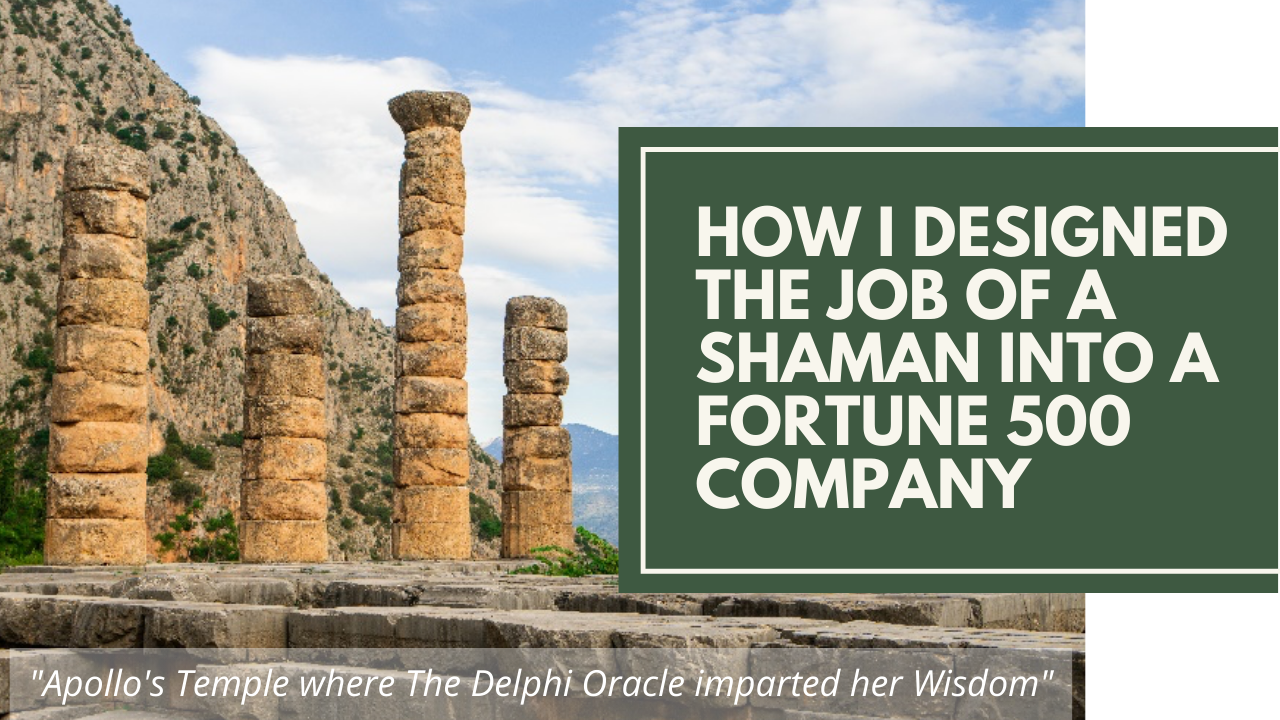How I Designed the Job of a Shaman Into a Fortune 500 Company

Watch the video of this post.
Listen to the podcast of this post.
I LOVE to help executives launch new organizations. New organizations represent bold moves by executives. They change the way people work and live. And best of all, they create new job opportunities.
I've been a student of structuring organizations since my PhD program in organization behavior 35 years ago. Until then, I never gave it a second thought that organization structures were proactively designed.
Being a student of this concept over decades, I am constantly in observation mode. I'm a geek when it comes to watching how organizations generate value. I go to restaurants and note who takes my order. Who cooks my meal. Who brings out my food. Who I pay. How seamless are the handoffs.
This geekdom of how work is organized extended to my time participating in Native American ceremonies in South Dakota on The Reservation. 23 years. Every summer for 3 weeks. It didn't take long before I started noticing key roles and how decisions were made. Aboriginal ways provide tremendous insight about our decision-making processes.
One particular role is prominent in Native American culture and is quite absent in our western-designed organizations.
Scouts were like Marketing, finding best hunting grounds. Hunters were like Sales, bringing in sustenance. Bowmakers were like IT departments, making essential tools. Cooks were like Operations, converting raw goods into finished consume-able products. Chiefs were like the C-Suite, providing guidance to the people.
But where was the Medicine Man? The Shaman.
Once I noticed the absence of The Shaman in organizations, I was eager to see how to implement that role in the corporate world.
Opportunity Strikes!
A client asked for help designing their new 500-person customer support organization: design, hire, onboard and fully operational in 7 months!
YIKES!
I worked directly with the newly appointed VP of Customer Support. I drafted about 40 one-page job descriptions to cover all the core jobs in the organization.
This was it. My chance. One job left.
How do I incorporate an Organization Medicine Man?
Well first, I have to expertly disguise the job title. I came up with Process Specialist.
I'm not qualified to talk about what a Medicine Person does. I'll leave that to those who claim that role. My observation, though, is that you go to Medicine Men and Women with the most gnarly problems to solve. You've tried everything and nothing worked. By the time you approach the Medicine Person, they already know your problem. There is a ritual or ceremony to come up with a solution just to solve your specific problem. Then, you must execute the prescriptive tasks provided. These tasks usually are incredibly difficult to complete. In fact, I would call it a Quest.
I gave the stack of 40 job descriptions to the VP of Customer Support on Friday for light reading over the weekend.
On Monday, he called me into his office.
"This is great. Thank you. I have a question, though, about one job. What is this Process Specialist?"
I described the job in more detail and sold the idea.
"Hmm. I've got just the guy for this job. Steve."
We launched that summer. I met Steve briefly in our Leadership Launch sessions, but that was it.
A year later, the VP of Customer Support asked me to do a one-year checkup on the organization to make sure everything was running as designed.
During my two-day review, Steve was eager to catch up and got a slot on my agenda.
"Thank you SO MUCH for designing my job. I was an Assistant Operations Manager for years and knew I would never get promoted to run a facility. My people skills aren't very good. This Process Specialist job is perfect. I get to sit in my office, pore over data, identify problems and SOLVE them. People get a little nervous when I approach because they know I know the operation so well I scare them sometimes.
And you know what? I love this role so much, I shared it with other operations facilities in the company and we have 3 more Process Specialists. We get together once a month and talk about the problems we face and how to do our jobs more effectively. I love trading stories and tips with them.
Thank YOU for giving me the job of a lifetime."
Even now it brings tears to my eyes to remember that conversation with Steve. This is exactly WHY I loved my consulting job. Days like that.
And in giving Steve a job of a lifetime, I also met a personal goal. I successfully created the role of a Medicine Person in Corporate America and as a huge bonus THEY created a Medicine Society sharing stories and tips.
So who is the Medicine Person for you? Your project? Your Team? Your Organization? Who is the one you go to with any problem? Who sends you on a Quest to resolve the stickiest of problems? Who generates the most innovative and bold solutions? Who keeps you aligned with your Vision?
Who is the keeper of Organization Wisdom?
Yes, there is great value in learning from our aboriginal ancestors!




